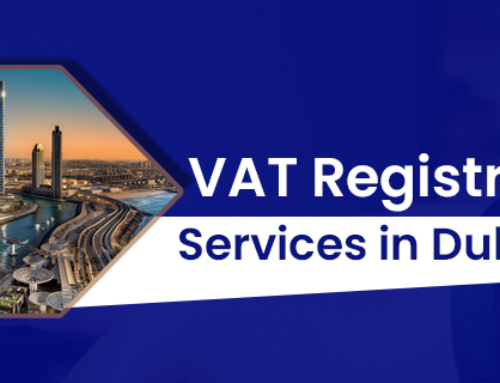Value Added Tax (VAT) was implemented in the UAE, which marked a fundamental shift in the taxation structure of the nation. On the majority of goods and services, a 5% VAT was imposed as of January 1st, 2018. While others are VAT-exempt, some goods and services are zero-rated. The UAE’s economic growth and diversification agenda has advanced significantly with the introduction of VAT. Businesses that have registered for VAT are required to collect VAT from their clients, who subsequently turn it over to the government.
The UAE government has implemented compliance inspections in addition to VAT registration to make sure that firms abide by the rules of the taxation system. Companies must have accurate, current, and complete books of accounts.
Businesses in the UAE have been significantly impacted by the installation of VAT since they now have to comprehend and abide by the rules established by the government. Working with a professional who can walk you through the procedure and make sure your company stays in line with the rules are crucial if you want to successfully navigate the complicated process of VAT registration and compliance.
At Whiteworth, we support businesses throughout the VAT registration and compliance process. To ensure compliance with the rules, our team of professionals can assist you with VAT registration, keeping up-to-date books of accounts, and organising tax-related documentation. We are aware of the significance of abiding by VAT laws and make sure that our clients are informed of any changes made by the government.
As a result of the introduction of VAT in the UAE, the taxation system underwent a considerable transformation, and the government made a significant advancement in the direction of economic expansion and diversification. However, this change has also made it necessary for businesses to comprehend and abide by the rules established by the government. Businesses may assure compliance with the VAT rules and maintain success in the expanding economy of the UAE with our professional guidance.
Which Businesses Require VAT Registration Services in Dubai?
Contents
- Which Businesses Require VAT Registration Services in Dubai?
- How to register for these services?
- Step 1: Make sure you’re eligible
- Step 2: Gather the necessary paperwork
- Step 3: Submit the form
- Step 4: Wait for Approval
- Step 5: Begin collecting VAT
- What are the advantages of VAT Registration in UAE?
- 1. Compliance with the Law
- 2. Increased Business Credibility
- 3. Better Financial Management
- 4. Claiming Input Tax Credit
- 5. Recognition in International Business
- 6. Increased Competitiveness
- 7. Government Contracts
Businesses must take VAT registration into consideration in the UAE in order to comply with local tax regulations. It’s crucial to remember that not all companies are required to register for VAT. Knowing whether your company needs to register for VAT is essential to avoiding fines and legal repercussions.
- When a company makes AED 375,000 or more in taxable supplies over the course of the previous 12 months, it is first needed to register for VAT. To ascertain whether your company has met the need for VAT registration, it is critical to maintain track of your taxable supplies.
- Businesses that have not yet achieved the statutory threshold may still choose to register for VAT voluntarily. Businesses that seek to grow or partner with larger organisations that require VAT registered companies may benefit from voluntary VAT registration. Additionally, it can aid in the credibility-building and clientele expansion of smaller businesses.
- Finally, some companies are not required to register for VAT. These companies include those with a revenue of less than AED 187,500 or those that only offer products and services that are free from VAT. It’s crucial to remember that exempt businesses must still keep accurate financial records and documentation.
Figuring out whether your company needs to register for VAT is crucial for adhering to UAE tax rules. Having a thorough understanding of the many circumstances in which VAT registration is necessary, optional, or exempt can assist firms in making wise decisions and avoid any legal implications.
Read Also This – Acquiring an E-commerce License in Dubai
How to register for these services?
It’s crucial to understand the VAT registration procedure if you’re starting a business in Dubai or are already running one. The steps to register for VAT registration services in Dubai are as follows:
Step 1: Make sure you’re eligible
You must ascertain whether your company qualifies for registration before submitting an application for VAT registration. As previously stated, companies must register for VAT if their taxable supplies and imports total more than AED 375,000 annually. Additionally, you should determine whether your company qualifies for any of the exempt categories or zero-rated supplies.
Step 2: Gather the necessary paperwork
The following step is to gather all the paperwork needed for VAT registration. These consist of:
- Memorandum of Association (MOA) for a Trade Licence.
- Articles of Association (AOA).
- Copy of the partners’ passports.
- Copies of the partners’ Emirates IDs.
- Bank statements from the last three months with evidence of the business’s address.
Step 3: Submit the form
Through the website of the Federal Tax Authority (FTA), you can electronically submit your application for VAT registration. You will need to register for an account, fill out all the requested information about your company, and upload all essential paperwork. A qualified tax agent who can help you with the registration process is an alternative.
Step 4: Wait for Approval
The FTA will send you a confirmation email after your application has been submitted. The FTA will assess your application and, if necessary, may ask for more supporting documentation. Your VAT registration certificate will be sent to you after your application has been approved.
Step 5: Begin collecting VAT
After receiving your certificate of VAT registration, you can begin adding VAT to taxable imports and supplies. Additionally, you must regularly file your VAT returns in accordance with the FTA’s instructions.
Read Also This – Dubai Startup Accelerators: 2023
Every business in Dubai is required to follow the VAT registration process. You can guarantee a simple and hassle-free VAT registration process for your company by following these steps. Make sure to stay updated on the most recent VAT regulations and, if necessary, seek professional help.
What are the advantages of VAT Registration in UAE?
For enterprises in Dubai with an annual revenue of more than AED 375,000, VAT registration is mandatory. However, there are a number of advantages to VAT registration that go above and beyond simply complying with the law. The following are some of the main advantages of Dubai VAT registration:
1. Compliance with the Law
Companies in Dubai are required to register for VAT if their annual sales volume exceeds AED 375,000. Businesses can avoid penalties or legal action for noncompliance and ensure that they are in conformity with the law by registering for VAT.
2. Increased Business Credibility
By registering for VAT, companies can show that they are committed to compliance and moral business conduct. By doing this, they may get more respect and credibility from clients, vendors, and other market participants.
Read Also This – steps to Initiate a Software Company in Dubai
3. Better Financial Management
Businesses must keep accurate and current records of their financial activities in order to register for VAT. Businesses can track their sales, expenses, and profitability more efficiently thanks to this, which aids in improved financial management and decision-making.
4. Claiming Input Tax Credit
For the VAT they paid on their purchases and expenses, businesses that are registered for VAT are eligible to collect input tax credits. This can lower their overall VAT obligation and enhance cash flow.
5. Recognition in International Business
The VAT is a widely used tax structure that many nations have embraced. Businesses can show that they are prepared to engage in international trade and business by registering for VAT.
6. Increased Competitiveness
By enabling firms to collect input tax credits, lower costs, and provide customers with more affordable prices, VAT registration can increase enterprises’ competitiveness. This could give them a market advantage and help them draw in more clients.
Read Also This – Real Estate Brokerage in Dubai
7. Government Contracts
Companies that have a VAT registration are eligible to bid on and win government contracts. Businesses may benefit from this by getting new opportunities and being able to grow their operations.
In conclusion, registering for VAT is an essential part of conducting business in Dubai. Companies that qualify for VAT registration are required to abide by UAE tax laws or risk legal consequences. Voluntary VAT registration can also help small firms gain reputation and grow their clientele. Among the many advantages of VAT registration are legal compliance, enhanced financial management, and access to a larger consumer base. It is essential to work with a specialist who can help you through the VAT registration procedure and make sure you continue to adhere to the requirements. Businesses in Dubai may avoid any legal repercussions, maintain precise financial records, and keep up with evolving requirements by using Whiteworth’s VAT registration services.






